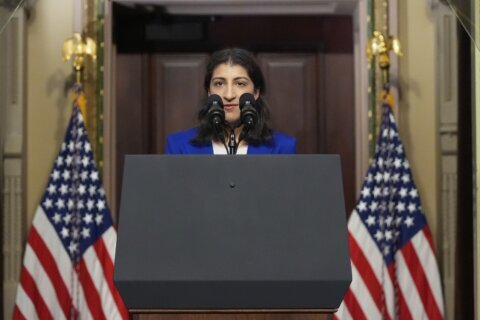In 2023, socially responsible investing in mutual funds and exchange-traded funds, or ETFs, is easier than ever before. That’s because there are dozens of options out there that specifically cater to investors looking at ESG metrics — that is, environmental, social and governance issues that arise for publicly traded stocks.
[Sign up for stock news with our Invested newsletter.]
These three key areas are all quite different. However, they are related because they look to put a priority on something else other than profits. That eye towards social responsibility over cold hard finances is a new development on Wall Street as more investors look to invest with their conscience in mind as much as their retirement goals. Here are seven socially responsible funds which take steps towards investing with your conscience:
— iShares ESG Aware MSCI USA ETF (ticker: ESGU)
— Parnassus Core Equity Fund (PRBLX)
— Vanguard ESG U.S. Stock ETF (ESGV)
— iShares ESG Aware MSCI EAFE ETF (ESGD)
— Impax Ellevate Global Women’s Leadership Fund (PXWEX)
— WisdomTree Emerging Markets ex-State-Owned Enterprises Fund (XSOE)
— iShares USD Green Bond ETF (BGRN)
What is ESG Investing?
If you’re unfamiliar with the finer points of ESG investing, here’s a brief primer on each of the letters in this increasingly important acronym.
Environmental. Perhaps the easiest of the three categories to understand, this metric involves an environmental overlay to ensure companies are being good stewards of the environment. However, it’s important to understand the kind of environmental measures that are being rated. Sometimes tech companies like Google parent Alphabet Inc. (GOOG, GOOGL) dominate environmental lists because they have built corporate campuses with solar power arrays and water efficiency systems. Other times, lists only include firms who are actively engaged in the manufacturing of those solar or water systems. There are a host of different ways to measure environmental responsibility, after all.
Social. The harsh reality of Wall Street is that it has long been dominated by old, white men in executive roles. And while there is a movement to ensure that boards and C-Suite teams are more representative of the diverse nature of the American workforce, some companies are obviously better at this than others. Social criteria for corporations will measure things like the number of women or minorities on a board of directors. And outside of America, some countries like the U.K. have mandated publication of gender pay gaps that can be used by social index providers. Whatever the methodology, the goal is the same: To ensure the stocks that you’re buying are being socially responsible instead of just providing opportunities to one small piece of the workforce.
Governance. Particularly in Big Tech, it’s common for founders to take their company public but retain near complete control of the enterprise anyway. Consider Meta Platforms Inc. (META), where Mark Zuckerberg holds more than 80% of the company’s Class B stock, and more than 50% of total voting power as a result. If you want to have a say in the company you own, META is clearly not for you. It’s also worth noting that in this age of globalization, there are companies with massive ownership from state actors like China or Saudi Arabia. If you don’t like the notion of a company plotting its strategy based on the influence of foreign governments, then governance metrics are also important to watch.
As you can see, there are lots of reasons to care about ESG. Maybe you’re interested in the upside potential of stocks solving the problem of global warming. Or maybe you don’t want to invest in companies that are lagging their peers in diversity metrics, or that have shareholder power consolidated in one or two owners.
But whatever your aim, the following socially responsible ETFs and mutual funds should help you invest with your principles in mind.
[SEE: 7 Ways to Invest in the Energy Storage Boom.]
Largest Socially Responsible ETF: iShares ESG Aware MSCI USA ETF (ESGU)
When it comes to the most popular option out there, the iShares ESG Aware MSCI USA ETF (ESGU) takes the crown. This ETF commands roughly $20 billion in assets under management at present and has more than seven years of trading under its belt.
The formulation is fairly straightforward, with more than 300 large- and mid-cap U.S. stocks that are selected based on “positive environmental, social and governance characteristics.”
As is so often the case with ESG funds, however, the nature of what is positive or negative behavior is up to the managers. For instance, as part of its investment objective, this fund is largely focused on excluding companies that are involved in civilian firearms, controversial weapons, tobacco, thermal coal and oil sands.
That means you get many of the same big names in a typical S&P 500 index fund such as Apple Inc. (AAPL), Microsoft Corp. (MSFT), and Amazon.com (AMZN). These may not be wind turbine manufacturers, nor are they trailblazing firms on the governance side, but they do avoid those negative areas, as do the rest of the holdings.
Largest Socially Responsible Mutual Fund: Parnassus Core Equity Fund (PRBLX)
Even larger, coming in at roughly $25 billion in assets, is the Parnassus Core Equity Fund (PRBLX). This is not an exchange-traded product, however, and is instead a mutual fund that can only be bought or sold after market close on a daily basis. However, this structural difference may not matter much if you’re into ESG for the long-term potential.
Though PRBLX doesn’t have any fancy buzzwords in the name, official literature says that the fund “invests in U.S. large-cap companies with long-term competitive advantages and relevancy, quality management teams and positive performance on ESG criteria.” That includes Big Tech stocks like Microsoft, as well as payment processor Mastercard Inc. (MA) and agricultural machinery giant Deere & Co. (DE).
But be warned that this ESG mutual fund is laser-focused on only about 40 holdings, and putting your eggs in fewer baskets means there’s added risk. For instance, PRBLX declined almost 30% last year while the S&P 500 only lost about 20% over the same period.
[READ What Is Sustainable Investing Portfolio Management?]
Other Socially Responsible Funds
Bigger isn’t always better, of course. So if you’re looking for a different way to play ESG via socially responsible funds, then these other options may have something more aligned with your personal investing goals.
Vanguard ESG U.S. Stock ETF (ESGV)
With nearly $6 billion in total assets under management, this socially responsible ETF from Vanguard is tied to a much larger group of holdings than others with about 1,500 total components. That may be an appeal for some investors who want the same old favorites like Apple, as well as exposure to a longer portfolio of relatively unknown stocks across all sectors of the American economy.
iShares ESG Aware MSCI EAFE ETF (ESGD)
Taking a global approach, this fund is focused on Europe, Australasia and the Far East to look at ESG-focused investments. This looks a lot like some of the domestic ESG funds with popular multinationals on the list, except they happen to have headquarters outside the U.S. These are picks like Nestle SA (NSRGY), health care giant Novo Nordisk (NVO) and luxury products giant LVMH Moet Hennessy Louis Vuitton (LVMHY), among others. As you can see, it’s not a requirement that these funds are actively selling solar panels or the like — just that they have better ESG ratings than their peers.
Impax Ellevate Global Women’s Leadership Fund (PXWEX)
If you are focused on gender diversity over environmental metrics, this $800 million mutual fund from boutique manager Impax invests in the highest-rated companies worldwide that are “advancing women through gender-diverse boards, senior leadership teams and other policies and practices.” About two-thirds of the assets are in U.S. stocks, but international companies do make an appearance. Top stocks at present include usual suspects like Apple, but also megabank Citigroup Inc. (C) as well as oddballs like Norwegian state-owned telecom Telenor (TELNY).
WisdomTree Emerging Markets ex-State-Owned Enterprises Fund (XSOE)
There are actually quite a few companies that have major investments from foreign governments and sovereign wealth funds, as well as a few state-run corporations that trade directly on public exchanges. This can create conflicts of interest or moral quandaries that investors may be uncomfortable with. Case in point, Russia-owned Rosneft was delisted and shunned by many investors in the wake of the Ukraine war. If you are concerned with geopolitics but want to still have a foothold in emerging markets, this $2 billion WisdomTree fund allows you to play these high-growth regions without reliance on the funds of state actors.
iShares USD Green Bond ETF (BGRN)
One final option for ESG investors is to look beyond just publicly traded stocks to invest in fixed-income markets. BGRN allows you access to “green” bonds, which are a special category of financial instrument used to fund projects that have positive environmental benefits. This could be a corporation raising money to invest in modernized and sustainable office buildings, but also projects like utility-grade solar farms backed by the European Investment Bank or International Finance Corporation. With a 12-month yield of about 3% on this bond ETF, you get a decent income stream from these bonds along with the peace of mind that comes with a focus on sustainability.
More from U.S. News
7 Stocks That Outperform in a Recession
6 Steps to Get Started With ESG Investing
5 Best Growth Stocks for the Next 10 Years
7 Best Socially Responsible Funds originally appeared on usnews.com
Update 03/22/23: This story was previously published at an earlier date and has been updated with new information.







